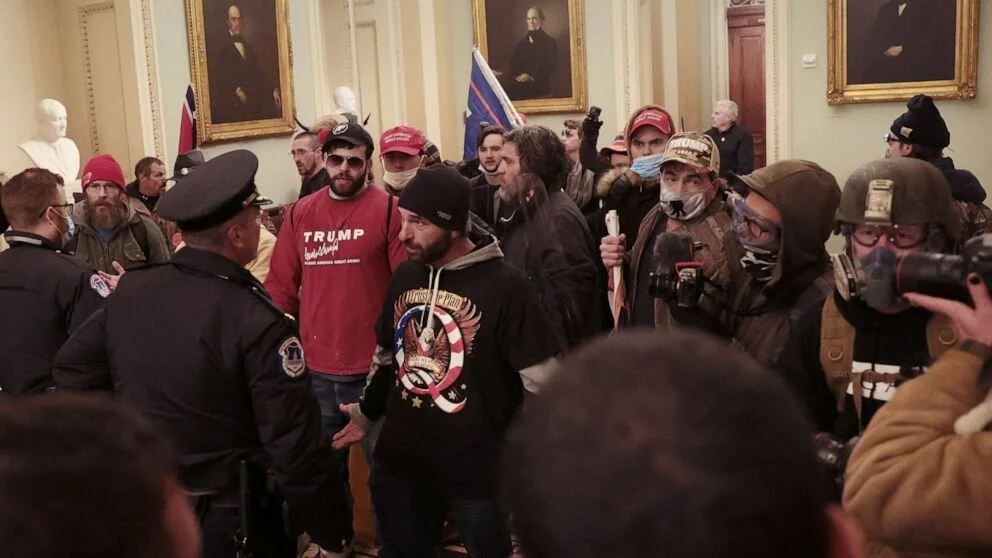Where Does Democracy Go From Here?
photo credit: Carol Guzy
The deadly insurrection on Capitol Hill this past January was a direct result of former president Donald Trump’s relentless attack on American Democracy. For two and a half centuries, American presidents have acted as both the head of government (like a prime minister in other regimes) and head of state (like a monarch). During his term in office, Trump took advantage of his power as a quasi-monarch in profoundly disturbing ways. He condoned racism and praised violent groups like the Proud Boys and the Oath Keepers. He also used his influence as the highest-ranking official in the country as a way to incite violence against reporters and political foes. On January 6, Congress convened to count the Electoral College votes that would confirm Joe Biden as the 46th president of the United States. Simultaneously, Trump encouraged his supporters to threaten our nation’s foundation with intimidation, violence, and anarchy during his "Save America" rally. And they did exactly as instructed.
Thousands of belligerent rioters fought with police, desecrated and ransacked the Capitol, and forced their way onto the House and Senate floors. The violent mob attempted to hunt down former vice president Mike Pence, after he finally acknowledged the president’s disregard for the Constitution, and the Speaker of the House, Nancy Pelosi, with the intent of executing them both. They were subsequently forced into hiding for their safety while Members of Congress were instructed to put on gas masks. They all hunkered in offices as Trump's supporters roamed about the Capitol yelling, “This is Trump's America.”
photo credit: Win McNamee
Then president-elect Joe Biden issued a statement that day that said, "At this hour, our democracy is under unprecedented assault unlike anything we've seen in modern times, this is not dissent. It's disorder. It’s chaos. It borders on sedition and it must end now."
The unprecedented attack on Jan. 6 was nothing less than domestic terrorism, mobilized by Trump, who continues to use blatant lies to manipulate his supporters. These lies have been repeated again and again in a classic fascistic manner, perpetrated by Trump, Republican U.S. Senators, and members of the U.S. House of Representatives —that Joe Biden and Kamala Harris were illegally elected and that the election was stolen. One month later, a majority of House Republicans still deny that Joe Biden and Kamala Harris were elected in a free, fair, open, and legal election.
So what does this mean for the future of democracy? The United States' image and reputation have been shaken to its core. However, the horrific event also showed the resilience of US democratic institutions. Despite the severe blow to our nation’s reputation, Congress was ultimately able to reconvene and certify the results of the election.
It seems clear that what happened on Jan. 6 will have serious repercussions on the entire political system, as well as on the major divisions in American society moving forward. The people of this nation will not forget this disturbing and mortifying day in our nation’s history. The vicious attack on the Capitol has also sparked a global outcry, especially from French President Emmanuel Macron and British Prime Minister Boris Johnson, who condemned Trump’s actions and urged him to respect the peaceful transition of power.
Perhaps the most significant response came from Konstantin Kosachev, chairman of the foreign affairs committee of the Russian Federation, who declared that following the events of Jan. 6 the US lost “any right or legitimacy to teach other countries any lessons in democracy.”
It is also clear that if Trump had not refused to concede the election, the violent attack on the Capitol, led by far-right militias and white nationalists, as well as the efforts of some members of Congress to revoke the election results, would not have happened at all. Trump broke the long-standing tradition of the peaceful transition of presidential power, a benchmark of American democracy for over two centuries.
Observers of American politics suggest that the majority of the 70 million or so Americans who voted for Trump claim that though they didn’t like Trump as a person; they felt that he endorsed policies or cultural positions that were “more in line with their values than those of the Democrats.” It appeared as though ordinary Republicans overlooked Trump’s persona because they believed he would carry out their agenda.
Now, after what transpired at the Capitol, the Republican Party is in shambles and needs to do some serious soul-searching to restore the public’s faith in its members.
But all the soul-searching in the world will be inadequate without significant political reforms—reforms designed to reimagine the entire American political system by changing the two-party system, changing the Electoral College, and unifying American society again. If President Biden is unsuccessful in fixing this broken system, the fragility and model of American democracy will continue to diminish. If he is unsuccessful, his administration’s ambition to champion liberal democratic ideas around the world will fail. Konstantin Kosachev is right. As of now, the US can no longer serve as a role model for other nations to emulate if its own institutions succumb to dysfunction, division, and mayhem.
There is no doubt that Trump is still a very dangerous threat to our democracy and national security. Democrats have less than two years to ensure that there will never again be a president who would incite a mob against his own government. We now fully understand the limits of the Republicans who believe they have any responsibility to govern, especially when a Democrat is president: seven Republicans to be exact. This is extremely problematic.
Republicans are already in the process of extreme partisan gerrymandering, making it nearly impossible for Democrats to win the House or most statehouses. The senate is currently constructed to benefit the more rural, Republican-dominated states. Some experts say Republicans could use redistricting alone to flip the half-dozen House seats needed to regain control of the chamber from Democrats in the 2022 congressional elections.
President Biden, Vice President Harris, Speaker Pelosi, and incoming Senate Majority Leader Schumer have each declared that democratic reform is one of their top priorities. The need to restructure and strengthen our democracy could not be more crucial than it is at this moment. Ultimately, democracy reform shouldn’t be a partisan issue, and until recently, it wasn’t. The For the People Act (FPA) was created “to expand Americans’ access to the ballot box, reduce the influence of big money in politics, strengthen ethics rules for public servants, and implement other anti-corruption measures to fortify our democracy, and for other purposes.” Virtually everything in the FPA is based on policy proposals that have won bipartisan support at the state level and, in some cases, even in Congress.
Credit: Katie Martin
The last time the Voting Rights Act was reauthorized, it had unanimous approval in the Senate and overwhelming support in the House; measures to restore protections of the Voting Rights Act have achieved bipartisan support in Congress. This year with Democrats controlling what makes it to the floor of the U.S. Senate, there’s a real possibility to have some good-faith negotiations. There’s an opportunity to pass an ambitious yet realistic package of reforms, regardless of changes to Senate rules. And no matter what happens in this Congress, the momentum for democracy reform will continue to increase. It will not happen overnight, but since FPA’s inception in 2019, almost all its policies have been successfully adopted in multiple states or localities across the country and have been shown to work. The momentum for reform has continued in multiple states. Success generates further success.
Trump and his cronies are fighting to win the battle for America's soul. But he will not win. Democracy will win. When we reflect on this turbulent chapter in our nation’s history, we will remember how January 6, 2021, was the day the United States started to repair its shattered democracy.






